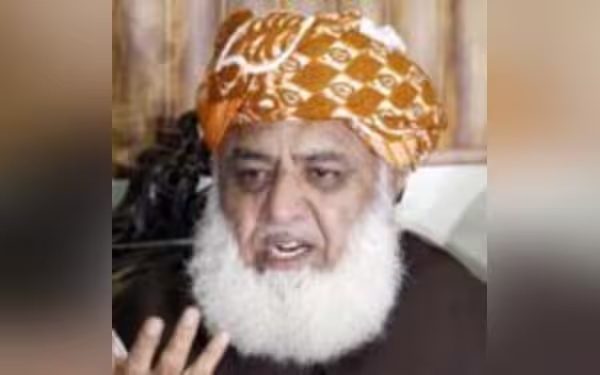Saturday, November 16, 2024 04:43 PM
Fazlur Rehman Advocates Consensus for Constitutional Amendments in Pakistan
- Fazlur Rehman emphasizes consensus over personal interests.
- He calls for reforms to restore governance in provinces.
- Rehman questions double standards in national issues.
 Image Credits: pakistantoday
Image Credits: pakistantodayFazlur Rehman stresses the need for consensus in constitutional amendments, prioritizing national interests over personal agendas in Pakistan.
In recent discussions surrounding the future of Pakistan's constitutional framework, Jamiat Ulema-e-Islam (JUI-F) chief Maulana Fazlur Rehman has made a compelling case for the necessity of consensus in constitutional amendments. His remarks come at a time when the political landscape is fraught with challenges, and the need for a unified approach has never been more critical.
During a meeting with senior journalists, Fazlur Rehman emphasized that any amendments to the constitution should not be driven by personal interests but rather by the collective needs of the nation. He stated, "We hope that constitutional amendments are passed with mutual agreement." This statement underscores the importance of collaboration among political factions to ensure that changes to the constitution reflect the will of the people rather than the ambitions of a few.
Fazlur Rehman further elaborated on the criteria for granting extensions, asserting that they should be based on necessity. He remarked, "An extension should be granted on the basis of need, not interests. We support the establishment of a constitutional court." This perspective highlights the need for a legal framework that prioritizes the country's stability and governance over individual agendas.
Reflecting on past experiences, Rehman expressed regret over the support given to former chief justice Iftikhar Chaudhry, noting that the outcomes were less than favorable. He stated, "We all supported Iftikhar Chaudhry, but we all saw the consequences of that decision." This acknowledgment of past mistakes serves as a reminder of the importance of learning from history to avoid repeating it.
Moreover, Rehman raised concerns about the current state of governance in two provinces, where he claimed armed groups have gained control. He pointed out, "One province has nationalists removed through rigging, and the other province saw religious parties pushed out. The state’s writ in Balochistan and Khyber Pakhtunkhwa has disappeared." This assertion calls attention to the pressing need for reforms that restore order and ensure that all voices are heard in the political arena.
Addressing the issue of double standards in the treatment of internal matters, Rehman questioned the inconsistency in how different groups are perceived. He stated, "When nationalists talk about separation, it is considered a domestic issue, but when it comes to religion, it is made an international problem. Why this double standard?" This inquiry invites a broader discussion on the complexities of national identity and the challenges faced by various groups within Pakistan.
Fazlur Rehman’s call for reforms that prioritize the national interest over personal gains resonates strongly in today’s political climate. He asserted, "The current deadlock and struggle are for personal interests. We want amendments to be made beyond individual gains, for the larger national interest. The involvement of institutions in elections cannot be seen as a symbol of national unity." As Pakistan navigates its constitutional challenges, the emphasis on consensus and collective well-being may pave the way for a more stable and inclusive future. It is crucial for all stakeholders to engage in meaningful dialogue and work towards solutions that benefit the entire nation, ensuring that the voices of all citizens are represented and respected.













